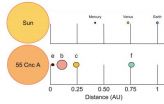(Press-News.org) (Lebanon, NH, 4/22/14). Dartmouth researchers have found that the anxiety experienced with a false-positive mammogram is temporary and does not negatively impact a woman's overall well-being. Their findings are reported in "Consequences of False-Positive Screening Mammograms," which was published online in the April 21, 2014 JAMA Internal Medicine
Anywhere from 40 to 60 percent of women who undergo routine screening mammography during a ten-year period will experience a false-positive mammogram. Such mammograms require additional testing, sometimes involving a biopsy, to confirm that cancer is not present. Researchers have suspected that increased anxiety, pain, and the bother of additional tests might adversely affect the quality of life for women who experience false-positive screening mammograms. In this study, Dartmouth researchers used data collected by the Digital Mammographic Imaging Screening Trial (DMIST), which was conducted by the American College of Radiology Imaging Network (ACRIN), to study the impact a false-positive mammogram has on women's lives.
"Most policy analyses of breast cancer screening have used assumptions about the harms of screening on health and overall well-being based on expert opinion rather than patient-reported outcomes," said principal author Anna N. A. Tosteson, ScD, James J. Carroll Professor of Medicine, professor of Community and Family Medicine and of The Dartmouth Institute for Health Policy & Clinical Practice at the Geisel School of Medicine at Dartmouth, and co-director of the Norris Cotton Cancer Center's Cancer Control Research Program. "The DMIST study did not support these assumptions, and gave us evidence that a false-positive mammogram experience has a limited impact on women's overall well-being."
The researchers studied personal anxiety and a standard measure of overall health and well-being often used by health economists to evaluate the effectiveness of health interventions. Attitudes toward future screening were measured by women's intention to use breast screening in the future, and how much they would prefer to have a hypothetical new type of mammography with a lower chance of a false-positive result.
While false-positive mammograms were associated with a temporary increase in women's anxiety, they had no measurable influence on overall health and well-being. Additionally, a false positive actually increased women's intention to use breast cancer screening in the future, and did not increase how much women preferred the new mammogram with fewer false positives. Another analysis showed that women's anticipated anxiety about future false-positive mammograms was associated with a strong preference for the new type of mammogram.
Tosteson noted that the study's findings suggest that there is an opportunity to educate women about the false-positive mammogram experience. "With all the controversy about mammograms and whether they result in a net benefit or harm for women, it is important for women to be educated about possible screening outcomes. Women need to make informed decisions that are based on their own risks and preferences," Tosteson said. "Our report can help those counseling women about breast cancer screening, and will also be useful to those developing mammography screening guidelines."
She stresses that further evaluation is needed, and that several groups sponsored by the National Cancer Institute are actively studying mammography screening, including the PROSPR (Population-based Research Optimizing Screening through Personalized Regimens) Network and the Breast Cancer Surveillance Consortium.
INFORMATION:The National Cancer Institute provided funding for the DMIST study (U01CA80098, U01CA80098-S1, U01CA79778, U0179778-S1, RC2/UC2CA148259 and U54CA163307), which was led by Dr. Etta Pisano. Drs. Anna Tosteson and Dennis Fryback co-led the DMIST Quality of Life Substudy.
About Norris Cotton Cancer Center at Dartmouth-Hitchcock
Norris Cotton Cancer Center combines advanced cancer research at Dartmouth and the Geisel School of Medicine with patient-centered cancer care provided at Dartmouth-Hitchcock Medical Center, at Dartmouth-Hitchcock regional locations in Manchester, Nashua, and Keene, NH, and St. Johnsbury, VT, and at 12 partner hospitals throughout New Hampshire and Vermont. It is one of 41 centers nationwide to earn the National Cancer Institute's "Comprehensive Cancer Center" designation. Learn more about Norris Cotton Cancer Center research, programs, and clinical trials online at cancer.dartmouth.edu.
False-positive mammogram anxiety has limited impact on women's well-being
Anxiety over false positive does not negatively influence future screening choices
2014-04-22
ELSE PRESS RELEASES FROM THIS DATE:
Cannabis chemistry: How scientists test pot for potency and safety (video)
2014-04-22
WASHINGTON, April 22, 2014 — Marijuana is in the headlines as more and more states legalize it for medicinal use or decriminalize it entirely. In the American Chemical Society's (ACS') newest Reactions video, we explain the chemistry behind marijuana's high, and investigate what scientists are doing to ensure that legalized weed won't send users on a bad trip. The video is available at http://youtu.be/4ukdUDCE56c
Subscribe to the series at Reactions YouTube, and follow us on Twitter @ACSreactions to be the first to see our latest videos.
INFORMATION:
The American ...
Researchers identify a mechanism linking bariatric surgery to health benefits
2014-04-22
Bariatric surgery has positive effects not only on weight loss but also on diabetes and heart disease. Researchers at the Sahlgrenska Academy and University of Cincinnati have shown that the health benefits are not caused by a reduction in the stomach size but by increased levels of bile acids in the blood. These findings, reported in Nature, indicate that bile acids could be a new target for treating obesity and diabetes.
Previous research from the Sahlgrenska Academy has demonstrated that obesity surgery is the only effective treatment for obesity and obesity-related ...
NeuroPhage discovers GAIM-changing molecules to combat Alzheimer's and related diseases
2014-04-22
Cambridge, MA, April 22, 2014 – Researchers from NeuroPhage Pharmaceuticals, Inc. have engineered a series of molecules with the potential to treat most neurodegenerative diseases that are characterized by misfolded proteins, such as Alzheimer's, Parkinson's and Huntington's diseases. These molecules are based on what the Company calls a general amyloid interaction motif, or GAIM, which recognizes a characteristic common to many toxic, misfolded proteins, not just one type of misfolded protein. This approach provides NeuroPhage with an array of therapeutic targets, so that ...
Sleep disorder linked to brain disease
2014-04-22
Researchers at the University of Toronto say a sleep disorder that causes people to act out their dreams is the best current predictor of brain diseases like Parkinson's and Alzheimer's.
"Rapid-eye-movement sleep behaviour disorder (RBD) is not just a precursor but also a critical warning sign of neurodegeneration that can lead to brain disease," says associate professor and lead author Dr. John Peever. In fact, as many as 80 to 90 per cent of people with RBD will develop a brain disease."
As the name suggests, the disturbance occurs during the rapid-eye-movement (REM) ...
Mysteries of a nearby planetary system's dynamics now are solved
2014-04-22
Mysteries of one of the most fascinating nearby planetary systems now have been solved, report authors of a scientific paper to be published by the journal Monthly Notices of the Royal Astronomical Society in its early online edition on 22 April 2014. The study, which presents the first viable model for the planetary system orbiting one the first stars discovered to have planets -- the star named 55 Cancri -- was led by Penn State University graduate student Benjamin Nelson in collaboration with faculty at the Center for Exoplanets and Habitable Worlds at Penn State and ...
Protein expression gets the heart pumping
2014-04-22
HOUSTON – (April 22, 2014) – Most people think the development of the heart only happens in the womb, however the days and weeks following birth are full of cellular changes that play a role in the structure and function of the heart. Using mouse models, researchers at Baylor College of Medicine have now been able to categorize the alternative splicing (the process in which genes code proteins, determining their role) that takes place during these changes and what mechanisms they affect.
The findings, which appear in Nature Communications, also helped to identify a ...
First brain images of African infants enable research into cognitive effects of nutrition
2014-04-22
Brain activity of babies in developing countries could be monitored from birth to reveal the first signs of cognitive dysfunction, using a new technique piloted by a London-based university collaboration.
The cognitive function of infants can be visualised and tracked more quickly, more accurately and more cheaply using the method, called functional near infra-red spectroscopy (fNIRS), compared to the behavioural assessments Western regions have relied upon for decades.
Professor Clare Elwell, Professor of Medical Physics at University College London (UCL), said: "Brain ...
Scientists discover a new way to enhance nerve growth following injury
2014-04-22
New research published today out of the University of Calgary's Hotchkiss Brain Institute (HBI) uncovers a mechanism to promote growth in damaged nerve cells as a means to restore connections after injury. Dr. Doug Zochodne and his team have discovered a key molecule that directly regulates nerve cell growth in the damaged nervous system. His study was published in the prestigious journal Nature Communications, with lead authors Drs. Kim Christie and Anand Krishnan.
"We made the surprising discovery that a protein called Retinoblastoma (Rb) is present in adult neurons," ...
Trio @ Sam Leong Road Preview 2nd Preview 2nd Quarter 2014
2014-04-22
Trio @ Sam Leong is a 4 story commercial development that consists of retail shops, entertainment outlets and restaurants. Developed by Singapore listed developer Tee Land, this development is strategically located behind Mustafa and is expected to draw traffic with its city fringe location.
The nearest MRT is Farrer Park MRT station within a 5 minute walk. A Central Business District (CBD), Orchard Road, Marina Bay Sands is only 10 minutes via train or drive.
Trio @ Sam Leong road has a good unit mix of retails shops and restaurants targeted to individual business ...
Alexsyss K. Tylor, host of the Vagina Power Show Debuts New Rap Artist, Dinero RED
2014-04-22
Alexsyss K. Tylor, better known for hosting the controversial Vagina Power Show and featured appearances on the Maury Povich Show and Comedy Central's Tosh 2.0, branched out into the music industry today by signing Dinero Red, debuting new video.
"Dinero RED is an amazing artist and lyricist, whose music is in alignment with my brand. I couldn't be happier to launch this new arm of my business; having Diner RED on board is a dream come true," said Tyler.
"This has honestly been such a huge turning point in my music career," announced Dinero RED, " we all know I'm ...
LAST 30 PRESS RELEASES:
Far-field superresolution imaging via k-space superoscillation
10 Years, 70% shift: Wastewater upgrades quietly transform river microbiomes
Why does chronic back pain make everyday sounds feel harsher? Brain imaging study points to a treatable cause
Video messaging effectiveness depends on quality of streaming experience, research shows
Introducing the “bloom” cycle, or why plants are not stupid
The Lancet Oncology: Breast cancer remains the most common cancer among women worldwide, with annual cases expected to reach over 3.5 million by 2050
Improve education and transitional support for autistic people to prevent death by suicide, say experts
GLP-1 drugs like Ozempic could cut risk of major heart complications after heart attack, study finds
Study finds Earth may have twice as many vertebrate species as previously thought
NYU Langone orthopedic surgeons present latest clinical findings and research at AAOS 2026
New journal highlights how artificial intelligence can help solve global environmental crises
Study identifies three diverging global AI pathways shaping the future of technology and governance
Machine learning advances non targeted detection of environmental pollutants
ACP advises all adults 75 or older get a protein subunit RSV vaccine
New study finds earliest evidence of big land predators hunting plant-eaters
Newer groundwater associated with higher risk of Parkinson’s disease
New study identifies growth hormone receptor as possible target to improve lung cancer treatment
Routine helps children adjust to school, but harsh parenting may undo benefits
IEEE honors Pitt’s Fang Peng with medal in power engineering
SwRI and the NPSS Consortium release new version of NPSS® software with improved functionality
Study identifies molecular cause of taste loss after COVID
Accounting for soil saturation enhances atmospheric river flood warnings
The research that got sick veterans treatment
Study finds that on-demand wage access boosts savings and financial engagement for low-wage workers
Antarctica has lost 10 times the size of Greater Los Angeles in ice over 30 years
Scared of spiders? The real horror story is a world without them
New study moves nanomedicine one step closer to better and safer drug delivery
Illinois team tests the costs, benefits of agrivoltaics across the Midwest
Highly stable self-rectifying memristor arrays: Enabling reliable neuromorphic computing via multi-state regulation
Composite superionic electrolytes for pressure-less solid-state batteries achieved by continuously perpendicularly aligned 2D pathways
[Press-News.org] False-positive mammogram anxiety has limited impact on women's well-beingAnxiety over false positive does not negatively influence future screening choices




